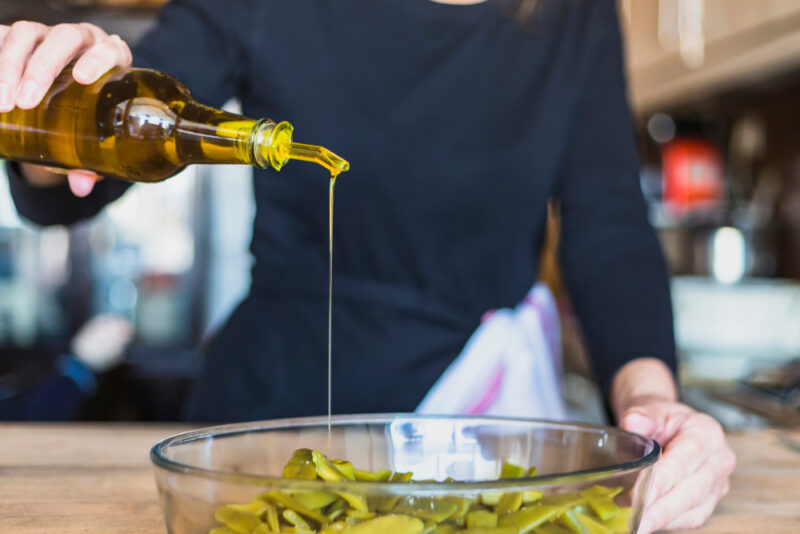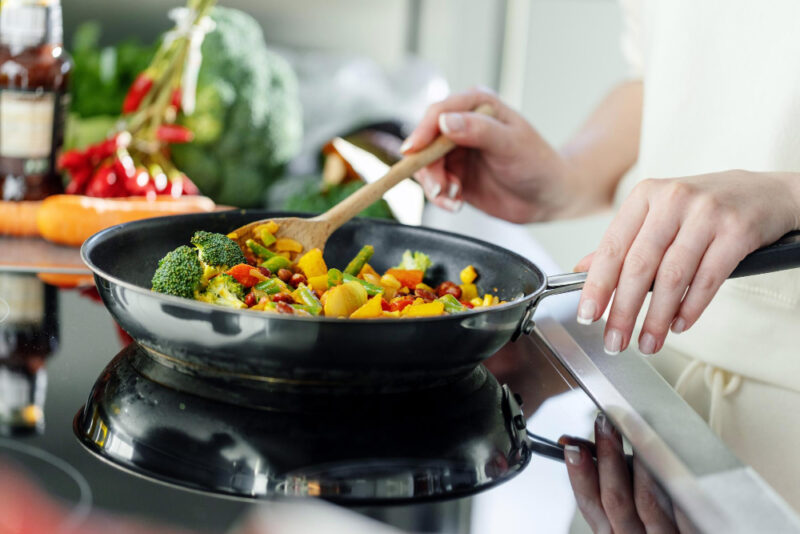Eliminate these two ingredients as soon as possible
We might think it’s okay occasionally, and it’s not uncommon for those who want to lose or maintain weight to let things slip. Sometimes were unaware that critical ingredients could be set-ups back.
Hidden ingredients, numbers, sugars and all the complex hard-to-read labels don’t help much either. They are also too small to read anyway!
Do we know what specific foods and ingredients are used in the foods we eat unless prepared & cooked in our kitchen?
I suspect most of us use the following two ingredients daily, not knowing how detrimental it could be to our weight loss efforts.
These are your hidden boulders if you are currently experiencing a weight loss plateau.

One: What oil do you cook with?
It seems a valid question, and we all must cook with oil.
But, some very cheap and common oils are not only bad for your health, but they also inhibit weight loss.
Certain oils are very dense in calories and poor in nutrient value, and we are pouring empty calories into pans!
Why not eliminate the need for frying oil by using a bit of water and balsamic vinegar instead?
Most vegetable oils contain unnatural ingredients and act as an emulsifier and dimethyl silicone, an anti-foaming agent. Most of these oils also have very high levels of omega-6, which we all should avoid;
Keep on the lookout for these culprits
- rice bran oil
- peanut oil
- corn oil
- cottonseed oil
- sesame oil
- soybean oil
Most of our population is obsessed with a Westernised diet, which has dramatically shifted the consumption of omega-6 oils. Scientists warn that too much omega-6 can lead to chronic inflammation.
Some of the most common diseases result from chronic inflammation, such as diabetes, cancer, heart disease and arthritis.
If we look around the world today, these diseases aren’t decreasing but exploding.
These conditions are likely the result of unsuitable food options coupled with a sedentary lifestyle.
Instead of resorting to vegetable oils, use these five essential oils instead.
Olive oil
Olive oil is one of the most popular and healthy cooking oils. It is a rich source of monounsaturated fats, which help to lower cholesterol levels and reduce the risk of heart disease. It also contains antioxidants that have anti-inflammatory properties. Olive oil is best for salads, sautéing, and low to medium-heat cooking.
Research shows that consuming a Mediterranean diet rich in olive oil can help to reduce the risk of cardiovascular disease, metabolic syndrome, and type 2 diabetes.
A study published in the Journal of the American College of Cardiology found that consuming a Mediterranean diet supplemented with extra-virgin olive oil can help to lower the risk of heart attack, stroke, and death from cardiovascular causes.
Coconut oil
Coconut oil is a versatile cooking oil rich in medium-chain triglycerides (MCTs), which are easily digested and provide a quick energy source. It also contains lauric acid, which has antimicrobial and antiviral properties. Coconut oil is best used for high-heat cooking, such as frying and baking.
Research has shown that consuming coconut oil can help to improve cholesterol levels, reduce belly fat, and enhance brain function.
A study published in the Journal of the Academy of Nutrition and Dietetics found that replacing other fats with coconut oil can help to lower cholesterol levels.
Avocado oil
Avocado oil is a rich source of monounsaturated fats and antioxidants with anti-inflammatory properties. It also has a high smoke point, which makes it ideal for high-heat cooking. Avocado oil is best used for grilling, roasting, and frying.
Research has shown that consuming avocado oil can help to lower cholesterol levels, reduce inflammation, and improve heart health.
A study published in the Journal of Nutrition found that consuming a diet rich in avocado oil can help to improve insulin sensitivity and lower blood sugar levels.
Peanut oil
Peanut oil is a healthy cooking oil rich in monounsaturated and polyunsaturated fats. It also has a high smoke point, ideal for high-heat cooking. Peanut oil is best used for frying and sautéing.
Research has shown that consuming peanut oil can help to lower cholesterol levels and reduce the risk of heart disease.
A study published in the Journal of the Academy of Nutrition and Dietetics found that consuming peanut oil can help to improve insulin sensitivity and lower blood sugar levels in people with type 2 diabetes.
Grapeseed oil
Grapeseed oil is a healthy cooking oil rich in polyunsaturated fats and antioxidants. It has a high smoke point, making it ideal for high-heat cooking. Grapeseed oil is best used for frying, sautéing, and baking.
Research has shown that consuming grapeseed oil can help to lower cholesterol levels, reduce inflammation, and improve heart health.
A study published in the Journal of Medicinal Food found that consuming grapeseed oil can help to improve insulin sensitivity and lower blood sugar levels in people with type 2 diabetes.

Two: What kind of flour do you use?
If you bake or use flour in your cooking regularly, what type are you using?
Be cautious about using refined white flour because it can prevent weight loss.
Refined flour is shallow (if any) in nutritional value while high in calories.
Both of these factors could lead to overeating and result in high blood sugar.
Refined flour is very high on the glycemic index chart and is known to raise your blood sugar much more rapidly than wholemeal or other flours containing fibre (banana, quinoa, buckwheat etc.).
It’s pretty easy to eat a slice of bread with a sugar-type topping and feel extremely hungry within a few minutes.
You will likely experience rapid cravings and hunger, leading to overeating.
Indulging in refined flour leads to weight gain over time and will put you high up in the category of developing type two diabetes — and other health challenges.
All refined flour lacks anything nourishing for your body.
To satisfy our appetite, eat less and still have enough energy during the day, we must eat more fibre, vitamins and minerals.
A wholegrain variety is valuable for our health and weight loss goals. You get abundant fibre, iron, magnesium, selenium, vitamin B and many more.
Low-fibre diets are linked to colon and colorectal cancer and, along with it, various digestive problems.
Here are the top five flours to stick with when baking.
Whole wheat flour
Whole wheat flour is nutritious and rich in fibre, vitamins, and minerals. It is made by grinding the whole grain, including the bran, germ, and endosperm. Whole wheat flour is best used for bread, muffins, and pancakes.
Research has shown that consuming whole grains, including whole wheat flour, can help to lower the risk of heart disease, stroke, and type 2 diabetes.
A study published in the American Journal of Clinical Nutrition found that whole grains can help reduce inflammation and improve insulin sensitivity.
Almond flour
Almond flour is a nutritious flour high in protein, healthy fats, and fibre. It is made by grinding almonds into a fine powder. Almond flour, including cakes, cookies, and bread, is best used for baking.
Research has shown that consuming almonds and almond flour can help to lower cholesterol levels, reduce inflammation, and improve heart health.
A study published in the Journal of Nutrition found that consuming almonds and almond flour can help to lower blood sugar levels and improve insulin sensitivity.
Oat flour
Oat flour is nutritious, rich in fibre and beta-glucan with cholesterol-lowering properties. It is made by grinding oat groats into a fine powder. Oat flour is best for baking, including bread, cookies, and muffins.
Research has shown that consuming oat flour can help to lower cholesterol levels, reduce inflammation, and improve heart health.
A study published in the Journal of the American College of Nutrition found that consuming oat flour can help to improve insulin sensitivity and lower blood sugar levels.
Spelt flour
Spelt flour is another type gaining popularity due to its health benefits. Spelt is an ancient grain closely related to wheat but has a different nutritional profile. It contains more protein, fibre, and minerals than wheat flour and is easier to digest for some people with wheat trouble.
Spelt flour is also a good source of B vitamins and has a lower glycemic index than wheat flour, which means it causes less of a spike in blood sugar levels. Spelt flour has a nutty flavour and can be used in various recipes, including bread, pasta, and baked goods.
Research has shown that spelt flour may have several health benefits, including reducing inflammation and improving heart health.
A study published in the Journal of Agricultural and Food Chemistry found that spelt flour has anti-inflammatory properties and may help to reduce the risk of chronic diseases like cancer and heart disease.
Another study published in the Journal of Nutrition and Metabolism found that consuming spelt bread can help to reduce cholesterol levels and improve blood sugar control in people with type 2 diabetes.
Spelt flour is a nutritious and flavorful alternative to wheat flour that may offer several health benefits. However, it’s essential to note that spelt flour contains gluten, so it’s unsuitable for people with celiac disease or gluten intolerance. If you’re looking for a gluten-free alternative to wheat flour, consider using one of the many other nutritious flours, such as almond flour, coconut flour, or quinoa flour.
Recap key learnings
Most oils used in restaurants and cafes are high in omega-6, which causes a dent in your weight loss efforts while also messing with your health.
Cooking at home is much safer and preferred if you want to lose weight successfully.
Buy coconut, olive and avocado oil, using those in your cooking and foods.
Coconut oil is excellent for cooking because it has a high smoking point and doesn’t become rancid.
Conversely, olive oil is best for salads, and you may lose some nutritional value when heating it.
As for flour, stick with wholesome sources, such as quinoa, buckwheat, coconut, wholegrain and banana. Give refined flours the flick, as all we need for good health has been stripped out.
Making these two simple shifts could change your results. Plus, you may look and feel a lot better & start seeing some weight loss results.
Please sign up via my link if you want to read more articles like this or start writing your owI’dI’d love to see you on the other side. ????????
Sign up here for your medium subscription.
I get a portion of your monthly fee at no extra cost to you, and it will go a long way in supporting me as a writer.
Download your FREE Fat Loss Recipe book here.
Disclosure: I only recommend products I would use myself, and all opinions expressed here are my own. This post may contain affiliate links that, at no additional cost to you, I may earn a small commission.

1 Comment